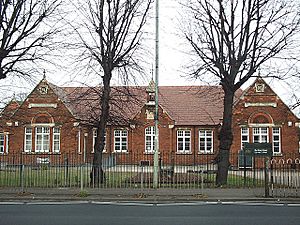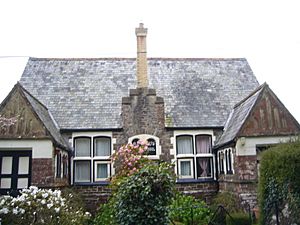School boards in England and Wales facts for kids
Quick facts for kids School board district |
|
|---|---|
| Category | Ad hoc single purpose |
| Location | England and Wales |
| Created by | Elementary Education Act 1870 |
| Created | 1870 |
| Abolished by | Education Act 1902 |
| Abolished | 1902 (1904 in London) |
| Number | c. 2,500 (as of 1902) |
| Government | School board |
| Subdivisions | Divisions (London only) |
School boards were special groups in England and Wales from 1870 to 1902. Their main job was to create and run schools for young children, known as elementary schools. These schools were often called "board schools."
Contents
How School Boards Started
A law called the Elementary Education Act 1870 allowed school boards to be set up. This happened in places where schools were needed. This law came about because people like George Dixon and Joseph Chamberlain wanted better education for everyone. They worked with groups like the National Education League. They wanted schools that were not controlled by the Anglican church. Even with these new schools, parents still had to pay fees.
The 1870 law said school boards could be created in several areas:
- The area of the Metropolitan Board of Works (which was in London).
- The area around Oxford.
- Every town with its own council (except Oxford).
- Every village or part of a village not covered by the above.
About 2,500 school boards were created between 1870 and 1896.
What School Boards Could Do
Each school board had important powers:
- They could raise money from local taxes to pay for schools.
- They could build and run schools that did not belong to a specific church. This happened where there weren't enough schools already.
- They could also help pay for existing church schools if needed.
- They could pay the school fees for children from very poor families.
- They could make a local rule (a by-law) that made school attendance required for children aged 5 to 13. This became a national rule for everyone with the Elementary Education Act 1880.
- They were not allowed to teach specific religious lessons, only simple Bible reading.
Who Could Be on a School Board
Members of school boards were chosen by direct election. This means people voted for them. They were not chosen by town councils or other local groups.
It was quite unusual for the time, but women were allowed to be elected to school boards. In the first elections in 1870, seven women were elected across the country. These included Lydia Becker in Manchester and Eleanor Smith in Oxford.
When School Boards Ended
School boards were stopped by the Education Act 1902. This new law replaced them with local education authorities. These new authorities were the councils of counties and large towns. The London School Board was replaced by the London County Council in 1904.
See also
- Joseph Chamberlain
- History of education in England
- National Education League
- Birmingham board schools
- List of former board schools in Brighton and Hove
- Board of education - US
Sources



